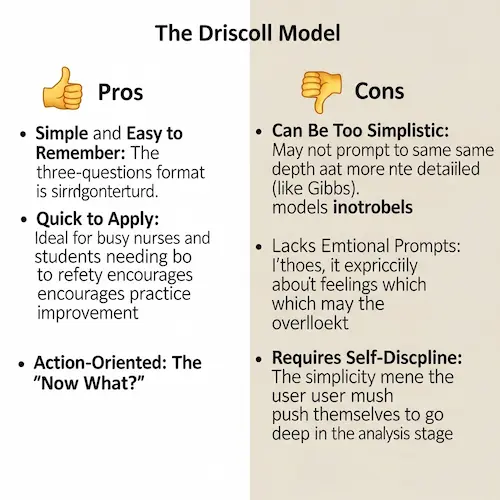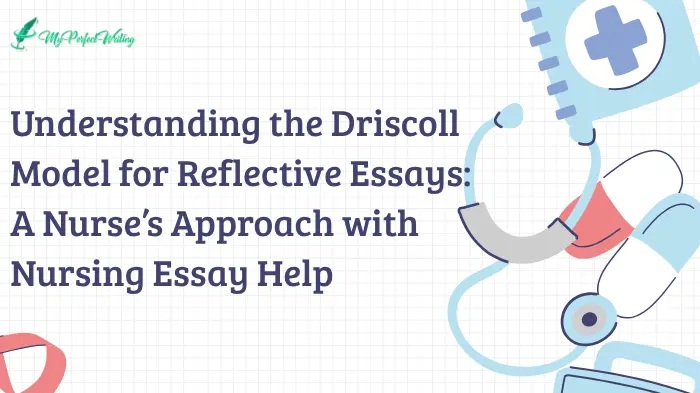What is the Driscoll Model of Reflection?
Developed by John Driscoll, this model is celebrated for its simplicity. It strips reflective practice down to three essential questions, making it an ideal tool for busy students and practitioners. The model encourages a cyclical process of learning, moving from description to analysis and finally to action.
The three core stages are:
- What? (Describing the event)
- So What? (Analyzing the event)
- Now What? (Proposing action for the future)
Breaking Down the Three Stages of the Driscoll Model
Stage 1: 'What?' – Describing the Experience
This is the objective starting point. Your goal here is to paint a clear, factual picture of the event you are reflecting on. Ask yourself:
- What happened, and where did it happen?
- Who was involved?
- What was my specific role in this situation?
Stage 2: 'So What?' – Analyzing the Significance
This is the heart of your reflection. Here, you move from description to analysis, exploring the meaning and impact of the event. This is where you connect your experience to nursing theory and professional standards. For comprehensive guidance on professional standards in reflection, the Royal College of Nursing (RCN) provides excellent resources. For expert nursing essay help, focus on questions like:
- What were my thoughts and feelings at the time?
- What have I learned about myself, my colleagues, or my practice?
- How does this experience relate to what I've learned in my studies?
Stage 3: 'Now What?' – Planning for the Future
The final stage is about action. Based on your analysis, what will you do differently? This demonstrates your commitment to improvement. If you need help with nursing assignment reflections, ensure you answer:
- What are the key takeaways I will apply to my future practice?
- What specific actions will I take to improve my skills?
- How will my practice change for the better?
Is the Driscoll Model Always the Best Choice?
While the Driscoll Model of Reflection is often praised for its simplicity and structured approach, it’s important to understand that it’s not always the best choice for every reflective process. The model is widely used in education, healthcare, and other professional settings due to its straightforward framework, but like any tool, it has its strengths and weaknesses.

When to Use the Driscoll Model:
Despite its limitations, the Driscoll model is incredibly useful when the goal is to quickly reflect on an experience and extract practical learning. It works well in contexts where the primary focus is on what happened, what was learned, and how to apply that learning moving forward.
For example, it is often used in clinical practice for healthcare professionals reflecting on patient interactions or in educational settings for teachers and students reflecting on lessons or assignments. It's also helpful when there is limited time for reflection, as it allows for a concise yet structured approach.
When to Consider Other Models:
If the situation requires deeper emotional processing or more theoretical analysis, you might want to consider other models. For instance:
- Gibbs’ Reflective Cycle: This model is particularly useful for understanding emotional responses and feelings.
- Kolb’s Experiential Learning Cycle: Ideal for situations requiring a deeper exploration of learning processes and how experiences shape knowledge.
- John’s Model of Reflection: Offers a more in-depth exploration of the self, which can be particularly beneficial in more complex or emotional situations.
Driscoll Model: Key Questions at a Glance
|
Stage |
Key Question |
Prompts for Your Reflection |
|---|---|---|
|
Stage 1 |
What? |
Describe the event objectively. What happened? Who was involved? |
|
Stage 2 |
So What? |
Analyze the meaning. How did you feel? What did you learn? |
|
Stage 3 |
Now What? |
Plan for the future. What will you do differently? How will you improve? |
Your Trusted Partner for Nursing Assignment Assistance
We understand the pressures of nursing school. That's where we come in, providing dedicated nursing assignment assistance to help you succeed.
- Expert Nursing Writers: Our team consists of writers with real-world nursing and academic experience.
- 100% Original & Plagiarism-Free: Every piece is written from scratch and comes with a plagiarism report.
- Confidential & Secure: Your privacy is guaranteed. We offer a secure service for all your academic needs.
- On-Time Delivery: We ensure you receive your high-quality work on time, every time.
- 24/7 Support: Whether you need last-minute nursing homework help or have a question, our support team is available 24/7.
Ready to ace your next reflective essay? Get a free quote from our nursing experts now!
Conclusion
The Driscoll Model of Reflection is a straightforward yet profound tool. By consistently applying the "What?", "So What?" and "Now What?" frameworks, you can transform everyday experiences into powerful learning opportunities, helping you become a more competent and self-aware nurse.
If you're struggling, don't hesitate to seek professional nursing assignment help UK. Let us help you articulate your reflections with the clarity and depth they deserve.
Frequently Asked Questions
Why is reflection so important in nursing?
Reflection allows nurses to learn from their actions, improve patient safety, enhance clinical skills, and meet the professional standards set by the Nursing and Midwifery Council (NMC).
How is the Driscoll model different from Gibbs' Reflective Cycle?
The Driscoll model is simpler with three questions. Gibbs' model is more detailed with six stages, which some find more structured but others more complex.
Can I use the Driscoll model for any type of nursing assignment?
Yes! It's incredibly versatile and perfect for reflective essays, case studies, critical incident analyses, and entries in your professional development portfolio.
How can your service help with my reflective essay?
Our nursing essay writing service UK can help you structure your reflection using the Driscoll model, ensure your analysis connects to nursing theory, and edit your work for clarity and academic tone.
How can My Perfect Writing assist with reflective writing using the Driscoll Model?
At My Perfect Writing, we provide expert guidance on reflective writing, helping you effectively use the Driscoll Model. Our nursing essay help UK ensures you break down each stage—' What?', 'So What?', and 'Now What?'—to enhance your reflective practice and improve your writing.
Meet Our Professional Essay Writers
Empowering Your Academic Writing Journey with Authority, Expertise, and Experience
Dr. Emma Wilson
PhD in Literature
Prof. James Chen
MSc in Computer Science
Dr. Sarah Ahmed
PhD in Law & Ethics
Ready to Work With Our Expert Writers?







